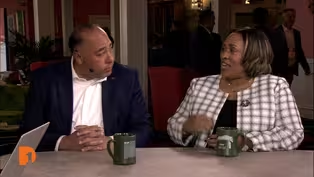
Experts explore link between mental health and truancy to improve education outcomes in Michigan
Clip: Special | 4m 18sVideo has Closed Captions
A conversation on the link between truancy and mental health at the 2025 Mackinac Policy Conference.
In Michigan, improving outcomes for K-12 students includes the need to address issues such as truancy. Missing school affects a child’s academic performance, well-being and overall development. Detroit Public Schools Superintendent Dr. Nikolai Vitti and The Guidance Center CEO Laura Huot, and Detroit Wayne Integrated Health Network President and CEO James White talk with One Detroit contributor Zo
Problems playing video? | Closed Captioning Feedback
Problems playing video? | Closed Captioning Feedback
One Detroit is a local public television program presented by Detroit PBS

Experts explore link between mental health and truancy to improve education outcomes in Michigan
Clip: Special | 4m 18sVideo has Closed Captions
In Michigan, improving outcomes for K-12 students includes the need to address issues such as truancy. Missing school affects a child’s academic performance, well-being and overall development. Detroit Public Schools Superintendent Dr. Nikolai Vitti and The Guidance Center CEO Laura Huot, and Detroit Wayne Integrated Health Network President and CEO James White talk with One Detroit contributor Zo
Problems playing video? | Closed Captioning Feedback
How to Watch One Detroit
One Detroit is available to stream on pbs.org and the free PBS App, available on iPhone, Apple TV, Android TV, Android smartphones, Amazon Fire TV, Amazon Fire Tablet, Roku, Samsung Smart TV, and Vizio.
Providing Support for PBS.org
Learn Moreabout PBS online sponsorshipWhat is the most significant mental health challenge that is contributing to truancy right now in the state?
I mean, I think some of what happened during the pandemic and kids being away from school for so long contributed to that.
We also have a lot of families that we work with single parent homes where there's not a lot of structure in the home, and that makes it difficult to reinforce the kids going to school.
But we do have a program, youth assistance program, and multiple nonprofits in Wayne County have this program where we focus on kids when there are issues like truancy or other at risk factors and try to make sure that they're attending regularly and follow up with their families and provide all kinds of other supportive services.
So we believe children need to be in school and they need to be able to and ready to learn.
And of course, so does the superintendent.
And you're doing some work within the district.
Dr. Vitti, how are you thinking about and addressing the mental health challenges that we're seeing that are just contributing to students simply not showing up to school?
Yeah, well, when you think of when when I think about some of the greatest challenges that we have as a school district, it's chronic absenteeism, certainly toward the top.
I mean, it's sort of cliché if you're not in school, you can't learn when you just look at our students and in the data, when students have missed 18 or fewer days of school, there are 3 to 5 times more likely to be at above grade level than reading math or to be college ready.
So we know that we're doing the right things in the classroom and it's been a journey and improving systems, processes, recruiting, retaining teachers.
But we're doing all that much better.
We just have to have the kids show up more.
So one of the main reasons, as you've already indicated, is mental health.
So as the district, we've done a lot and I think we're really leading in a lot of different ways across Michigan and what we're doing with our screening.
All of our students are looking at risk adverse survey at the beginning of the year, 3rd to 12th graders and that survey is research-based to determine, you know, what challenges our students face from anxiety to fear to depression based on the trauma they've experienced.
From there, you can identify the students and then we have mental health support now in all of our schools, contracted.
So when students take that survey and and a red flag is raised you can connect them to one on one or small group therapy as long as the parent signs off on that.
And I think that's gone a long way to providing direct for them.
And we've developed Help Hub now across the city.
Free access to mental health support for families and students.
Free dental, medical and vision screening aside from mental health.
But those are just some of the ways we're starting to attack the issue.
And I think it is making a difference.
When we look at chronic absenteeism, we've got a lot of work to do.
But finally at the end of this school year, we're finally going to get put back to at least pre-pandemic levels with average yearly attendance and chronic absenteeism.
But I think we're moving in the right direction.
We often say that kids are our future.
Kids are our right now, so we need to make sure we do everything we possibly can to give them access to resources.
One of the programs that I'm most proud of is our School Success Initiative, where we're in the schools, we're working with our teachers, we're working with our counselors.
A number of our providers are on board with that, just really servicing the whole child.
You know, head to toe.
Dr. Beatty talked about, you know, access to dental, access to health services, but more importantly, access.
And so we're using our mobile crisis vehicles.
We have a mobile clinic that we're rolling out to our community to destigmatize this notion of mental health and making them feel okay about access.
Right.
Just coming in and having a conversation.
Could a WNBA franchise be coming to Detroit?
Video has Closed Captions
Clip: Special | 5m 50s | Detroit business, sports and entertainment leaders discuss a bid for a WNBA franchise in the city. (5m 50s)
Destination Detroit initiative tells the region's story through the people who shaped it
Video has Closed Captions
Clip: Special | 2m 55s | A conversation about Detroit PBS’ Destination Detroit initiative at the Mackinac Policy Conference. (2m 55s)
Gov. Gretchen Whitmer delivers keynote address at 2025 Mackinac Policy Conference
Video has Closed Captions
Clip: Special | 4m 19s | Gov. Gretchen Whitmer delivers a speech on Michigan’s progress at the Mackinac Policy Conference. (4m 19s)
Michigan Chief Growth Officer Hilary Doe discusses the state's talent growth efforts
Video has Closed Captions
Clip: Special | 2m 56s | Contributor Zoe Clark talks with Hilary Doe and Rick Baker about talent growth efforts in Michigan.s (2m 56s)
Michigan leaders share how federal funding cuts are impacting their programs and services
Video has Closed Captions
Clip: Special | 2m 45s | Michigan leaders share how federal funding cuts are impacting their programs and services. (2m 45s)
Mike Duggan discusses Detroit’s progress in last Mackinac Policy Conference speech as mayor
Video has Closed Captions
Clip: Special | 4m 41s | Mayor Mike Duggan discusses Detroit’s progress during his tenure at the Mackinac Policy Conference. (4m 41s)
Ride United program works to close transportation gaps for Detroit residents
Video has Closed Captions
Clip: Special | 3m 30s | Ride United program works to close transportation gaps for Detroit residents (3m 30s)
U.S. Ambassador to Canada Pete Hoekstra talks trade relationships between U.S. and Canada
Video has Closed Captions
Clip: Special | 2m 23s | U.S. Ambassador to Canada Pete Hoekstra discusses foreign trade at the Mackinac Policy Conference. (2m 23s)
U.S. representatives from Michigan discuss talent, infrastructure and new federal policies
Video has Closed Captions
Clip: Special | 5m 32s | U.S. representatives from Michigan discuss talent, infrastructure and new federal policies. (5m 32s)
Providing Support for PBS.org
Learn Moreabout PBS online sponsorship
- News and Public Affairs

Top journalists deliver compelling original analysis of the hour's headlines.

- News and Public Affairs

FRONTLINE is investigative journalism that questions, explains and changes our world.












Support for PBS provided by:
One Detroit is a local public television program presented by Detroit PBS








